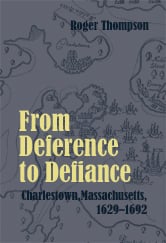[Editor's note: The post originally appeared in Vita Brevis on 15 May 2014.]
 Why most people went to Charlestown during the seventeenth century we can only guess. Individuals were usually far too occupied during preparation, emigration, and plantation to record their reasons for undertaking this life-threatening ordeal. We can only adduce possible factors from the heart-searchings of such (hardly typical) emigrants as Governor Winthrop, and from the prevailing conditions in emigrant areas of England.
Why most people went to Charlestown during the seventeenth century we can only guess. Individuals were usually far too occupied during preparation, emigration, and plantation to record their reasons for undertaking this life-threatening ordeal. We can only adduce possible factors from the heart-searchings of such (hardly typical) emigrants as Governor Winthrop, and from the prevailing conditions in emigrant areas of England.
Charlestown was settled by striving young Bristolians and Londoners driven to escape the frustrating economic conditions at home. Historians of early seventeenth-century London and Bristol emphasize the power of privileged corporate groups like the East India Company, the Levant Company, and the London and Bristol Merchant Adventurers over traditional links with the Iberian Peninsula, the Mediterranean, and the Far East.
The enterprise of outsiders and newcomers was diverted to opening up fresh markets and commodities, especially in the North Atlantic and the Caribbean, not to mention interloping in forbidden areas and smuggling protected cargoes. Significantly, many of these commercial outsiders were residential outsiders as well, coming from two predominantly commercial and industrial overspills, Stepney and Southwark. Here the influence and control of the great London merchants was much reduced.
Most Charlestown merchants and skippers had continuing old-country connections. Emigration involved them as New England contacts and agents for international family firms. For them relations with the old world were not ruptured, and many of them returned to England on brief business visits, or, after the defeat of the monarchy in the 1640s, on extended missions.
After 1633, when Bishop Laud of London became Archbishop of Canterbury, every Puritan minister and lay group in England was under threat. Preachers and their followers faced hostile interrogation, summary trial, dismissal, and imprisonment or exile; in Laud’s words, he would “harry them out of the land.”
Old England was a toxic carcass to abandon; New England, increasingly familiar, an unsullied opportunity to embrace. Charlestown offered the possibility of religious purity, a utopian fresh start. It also held out the prospect of free and ample land to the landless, to insecure tenants and stunted households. It was a West Atlantic base for the exploitation of rich natural resources by resident agents of family firms. Both a refuge and a springboard, the haven at the northern lip of the Charles River would weld together a remarkable and diverse collection of settlers into a biddable and cohesive town, at least for the first half of its existence.
Adapted from Roger Thompson’s From Deference to Defiance.
Share this:

About Roger Thompson
Roger Thompson is the author of Sex in Middlesex, Divided We Stand, Cambridge Cameos, and From Deference to Defiance, among other works.View all posts by Roger Thompson →